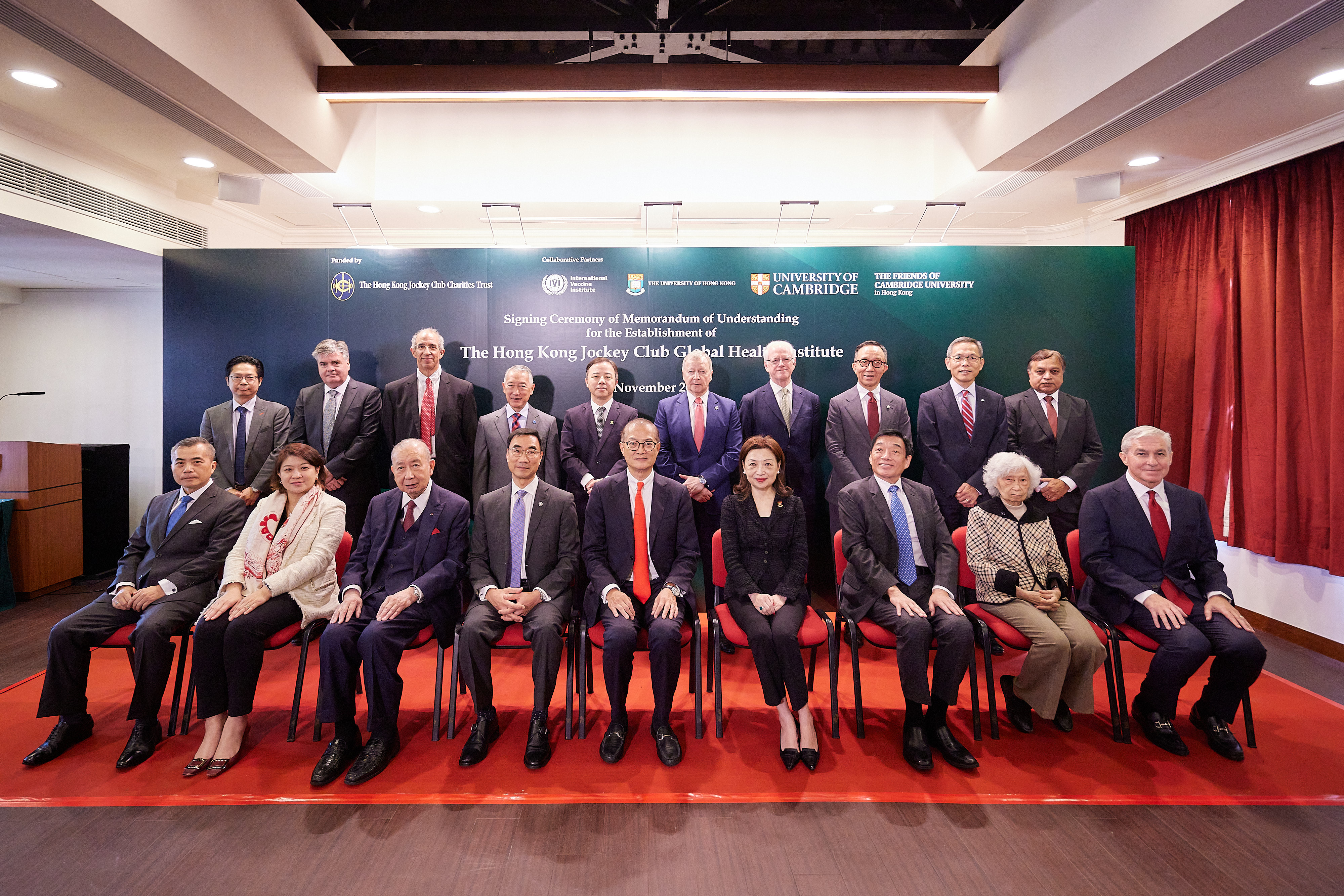15 November 2023
The University of Hong Kong (HKU), the University of Cambridge (UCAM), and the International Vaccine Institute (IVI) signed a Memorandum of Understanding (MoU) today to establish the international headquarters of The Hong Kong Jockey Club Global Health Institute at HKU (‘The Institute’ or ‘HKJCGHI’). This collaboration aims to enhance pandemic preparedness, and accelerate cutting-edge vaccine research, development and implementation with the aid of a global research support from The Hong Kong Jockey Club.
Advancing Pandemic Preparedness
HKU’s LKS Faculty of Medicine (HKUMed) will serve as the headquarters and lead for the ground-breaking partnership, bringing together the collective expertise and strengths of HKU, IVI and UCAM. This collaboration aims to tackle global challenges posed by recent pandemics and bolster preparedness at the academic, industry and policy levels, translating research into practical applications that effectively prevent and mitigate epidemic and endemic infectious diseases that have a national, regional or global impact.
Driving Research Innovation and Enhancing Vaccine Accessibility
The Institute will adopt a multifaceted strategy to strengthen the global response to pandemic threats and foster equitable access to safe and affordable vaccines worldwide, particularly in low- and middle-income countries. This comprehensive approach includes systemic surveillance, early detection, advanced diagnostics, adaptable clinical trials, streamlined manufacturing technologies, and optimised supply chain management for efficient vaccine deployment.
Nurturing Future Leaders
Recognising the importance of nurturing the next generation of global health experts, the Institute will offer a range of programmes, such as apprenticeships, exchange scholarships, and coaching platforms, to train and inspire future leaders in the field.
Officiating the signing ceremony, Professor Chung-mau Lo, the Secretary for Health of the Government of the HKSAR, said, ‘I would like to extend my heartfelt thanks to The Hong Kong Jockey Club for their exemplary philanthropy. The COVID-19 pandemic demonstrated graphically and comprehensively the critical importance of vaccine innovation and development as well as global health co-operation. The establishment of the Hong Kong Jockey Club Global Health Institute marks an important milestone in this mission.’
Michael TH Lee, Chairman of The Hong Kong Jockey Club, emphasised the significance of this historic collaboration, ‘Hosted by the University of Hong Kong, The Hong Kong Jockey Club Global Health Institute will bring world-leading scientists and research teams from the International Vaccine Institute and the University of Cambridge to Hong Kong to work on translational vaccine research. With vaccines being the most powerful means of disease control, we want it to become a platform for fostering collaboration and cross-pollination of cutting-edge technologies.’
Priscilla Wong Pui-sze, Chairman of the HKU Council, echoed, ‘It is so right that we are here to think about the future, and how to prevent, and prepare for future epidemics or pandemics. With the signing of this Memorandum of Understanding, I am sure that together, we are able to advance vaccine research in the region, ramp up strategic and innovative solutions to address global health challenges, support evidence-informed decision-making for health policy, and strengthen trust in science.’
Strategic Location at HKUMed
The collaboration will benefit from HKUMed's 25 years of expertise in research on emerging infectious diseases. HKUMed is a world leader in studying influenza viruses and coronaviruses, particularly their potential to cause zoonotic diseases with pandemic implications. Its School of Public Health is a WHO reference laboratory for animal H5 and COVID-19, and actively advises global health institutes, like the World Health Organization, to shape global health policies and responses.
HKUMed’s proximity to the Chinese biomedical infrastructure offers unique advantages in tapping into the diverse biotechnology companies and industries in the region, thus contributing significantly to global public health.
Professor Patrick Maxwell, Regius Professor of Physic and Head of School of Clinical Medicine of UCAM, said he was excited to be taking part in the establishment of the Institute. ‘It is a great privilege to be partnering with these successful and inspirational organisations, and to benefit from the invaluable support of The Hong Kong Jockey Club. Today’s ceremony is a milestone in the journey to a strong and fruitful partnership between communities that share a passion for learning, for science, and for better health for all.’ He added that there is no better time to accelerate work on pandemic preparedness, ‘The past few years have taught us a great deal – not least about sharing intelligence and strengthening communication. At Cambridge we are delighted that we will be working in partnership with the University of Hong Kong and the International Vaccine Institute. We continue to build our successes on great collaborations, which help us to act quicker, work smarter, and achieve more.’
George Bickerstaff, Chairperson of the Board of Trustees of IVI, said, ‘We are incredibly excited to join forces with The Hong Kong Jockey Club, the University of Cambridge, and the University of Hong Kong to create a vital new hub for vaccine science and education. The founding of The Hong Kong Jockey Club Global Health Institute is an exemplar of positive partnership between research, academia, and philanthropy coming together for public good. IVI is grateful to The Hong Kong Jockey Club for the support and opportunity to take part in this essential effort.’
Under the umbrella of HKJCGHI, six functional units will support the Institute’s goals and mission. These units will host experts, employ specialised operating procedures, and utilise state-of-the-art equipment and infrastructure to carry out the planned studies.
Media enquiries
Please contact LKS Faculty of Medicine of The University of Hong Kong by email (medmedia@hku.hk).



Follow HKUMed